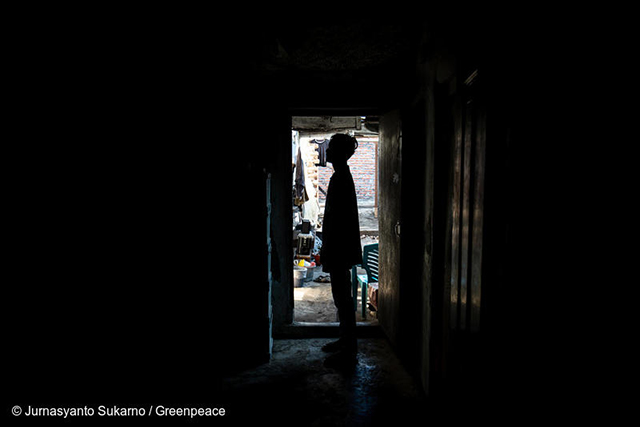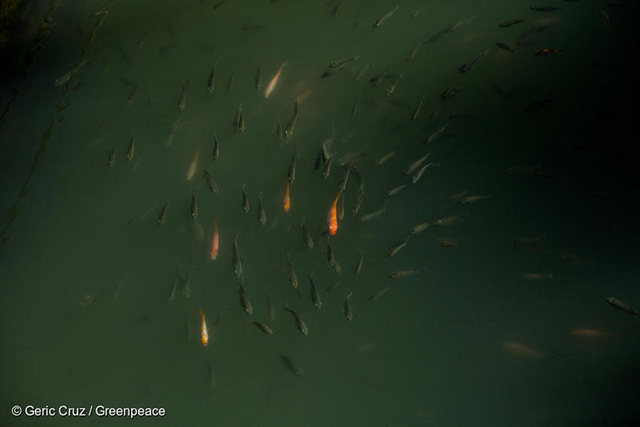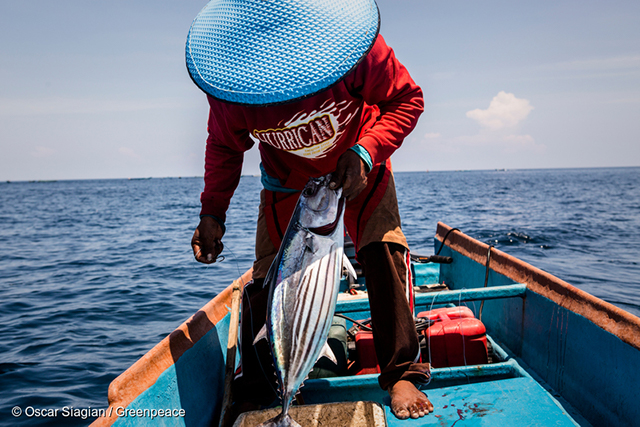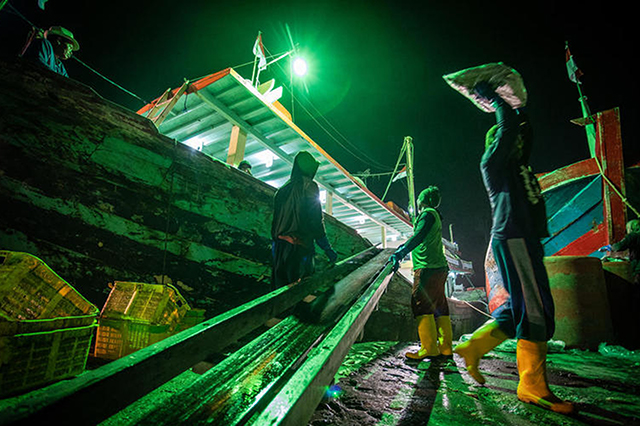What’s the Catch? Forced Labour and Trafficking in the Taiwanese Distant Water Fishing Industry
26 May 2020

Seafood is one of the most traded food commodities in the world, with an estimated annual value of USD $153 billion. Around USD $42 billion of that is from tuna, a highly migratory species that traverse areas of our oceans beyond national jurisdictions, also known as the high seas.
Whether fresh, frozen, or canned, tuna is found nearly everywhere we shop and eat. But not all tuna are harvested in the same manner, nor are all workers catching and handling the tuna treated the same way.
The Human Cost of the Distant Water Fishing Industry
Recent headlines have once again shone a bright spotlight on the troubled distant water fishing (DWF) industry.
In the last six months, NGOs and media have reported numerous instances of alleged forced labour and trafficking of Indonesian migrant fishers onboard Chinese-flagged, Taiwanese-flagged, and foreign-flagged vessels owned by Taiwanese citizens.
Governments are taking strong action with the US announcing a detention order on all tuna and other seafood harvested by the Taiwanese-flagged vessel, Yu Long No. 2, for suspected forced labour, and Indonesia calling on the UN to do more to protect migrant fishers in the global fishing industry.
The issue is unlikely to fade from the public conscience anytime soon. Human rights, labour, and environmental advocates eagerly await the US Department of Labor 2020 List of Goods Produced by Child Labor or Forced Labor (2020 TVPRA List), which many expect will be much more comprehensive this year in its coverage of forced labour in global tuna fisheries and prompt more serious action from governments, corporations, investors, and consumers.

Forced Labour in Taiwanese Distant Water Fishing Fleets
Taiwan, better known to the business and human rights community for its electronics industry, has long been one of the biggest players in the global fishing industry. Yet few outside of the fisheries realm know it is the second-largest fishing entity on the high seas, with over 1,000 Taiwanese-flagged and over 200 Taiwanese-owned, foreign-flagged DWF vessels. It is the largest longline tuna exporter in the world. It is also the second largest supplier of frozen tuna to Thailand, a country many know as the largest tuna processor in the world.
Taiwan also has a long history of egregious human rights abuses in its DWF fleet, including beatings leading to death and the trafficking of hundreds of Cambodian migrant fishers. The Indonesian government recently reported that it has received more complaints about the Taiwanese fleet in the last two years than all other fleets where Indonesians work.
Greenpeace’s recent submission on Taiwan for the US Department of Labor 2020 TVPRA List concludes that
“forced labor is not an isolated practice limited to one or a few companies, but a government-enabled model of exploitation that has been endemic in the industry for many years ... Taiwan’s laws, policies, and practices that enable overexploitation of global tuna fisheries at the expense of vulnerable Southeast Asian migrant fishers … include overcapitalization of the DWF fleet, transshipment at sea, inadequate observer coverage on longline fishing vessels, lack of port State labor inspections, ineffective and inadequate restrictions on time at sea, systematic discrimination against migrant fishers, and lack of oversight by the competent authority on labor matters.”
Other issues highlighted in the briefing include debt bondage, withholding of wages, and excessive overtime.
Corporate progress on eradicating modern slavery in tuna fisheries remains slow
Nearly six years after international media began exposing modern slavery in the seafood supply chains of US and European brands and retailers, progress has been slow, policies have been largely disappointing, and good practice continues to be the exception rather than the norm.
Transparency remains elusive as most companies have yet to take the step beyond policies and processes to reporting on negative impacts and their remediation.
A 2019 Business & Human Rights Resource Center (BHRRC) report on modern slavery in Pacific supply chains of canned tuna captures the glaring gap between rhetoric and reality in the tuna industry. Of the 35 companies BHRRC surveyed, none disclosed having found a single worker in modern slavery in their supply chains, yet 18 reported having a human rights due diligence process and 4 reported having due diligence policies and procedures that specifically address the risk of modern slavery in their supply chains.
Modern slavery in tuna fisheries is not a new problem and the recent cases highlight the need for companies, investors, and governments to take more robust actions to fulfill their responsibilities under the UN Guiding Principles on Business and Human Rights (UNGPs).

The Role of Brands and Investors in Building a Sustainable Fishing Industry
How do investors and other concerned stakeholders reconcile the lack of transparency in the tuna industry with the modern slavery statements of companies purporting to make significant efforts to tackle forced labour and trafficking in their seafood supply chains?
The dearth of reporting on negative human rights impacts and their remediation casts doubt on corporate commitments to effectively address modern slavery in the tuna industry. While human rights policies and due diligence processes are important steps, they are not sufficient to fulfill the corporate responsibility to respect human rights.
Investors should use their leverage to incentivise and drive further corporate reforms in line with expectations under the UNGPs.
A truly sustainable fishing industry requires decent work within the biological limits of our oceans and prioritises the needs of coastal communities and small-scale fisheries over large-scale industrial fisheries. It also calls for low-impact fishing methods that minimise harm to non-targeted species and marine habitats. Environmental protection and human rights protection in tuna fisheries are interdependent and the solutions brands and investors seek must address both labour exploitation and overfishing.
To this end, Greenpeace has developed a set of recommended reforms for retailers, brands, and seafood companies. The eight priority reforms are:
- Human rights due diligence and remediation
- Transparency in both fishing and labour practices
- Equality and non-discrimination
- Limiting continuous time at sea
- Ending transshipment at sea
- Fair recruitment
- Freedom of association and collective bargaining
- 100% independent human or effective electronic catch monitoring
Fair Recruitment and Employment of Migrant Fishers
Recruitment fees and deposits are an industry-wide problem and the Employer Pays Principle, if effectively implemented, could help reduce forced labour in the Taiwanese fleet. Companies sourcing from the Taiwanese fleet should adopt best practice in ensuring no fees or deposits are charged to migrant fishers. This includes direct repayment of any fees or deposits to migrant fishers, monitoring fishing companies for violations of Taiwan’s regulation on hiring migrant fishers in the DWF industry, and following the recommendations of NGOs and trade unions that track the recruitment practices of manning agencies in migrant fishers’ countries of origin.

Decent Work At Sea
Ending transshipment at sea and limiting continuous time at sea to three months would address one of the biggest risks for migrant fishers in the DWF industry – remote operations with little opportunity to escape abuse.
Transshipment at sea, the practice of offloading catch from a fishing vessel onto a refrigerated cargo vessel far away from port, enables unscrupulous operators to smuggle illegally caught fish into the market by mixing them with legal catches. This practice also enables vessels to operate at sea for months or years at a time without returning to port and it has been documented as a mode of transportation for labour trafficking.
Unlike the shipping industry, there is currently no international law that limits continuous time at sea for the fishing industry. The ILO Maritime Labour Convention, which governs the shipping sector, explicitly excludes fishing vessels from its scope of application and the ILO Work in Fishing Convention does not limit continuous time at sea either. A new global standard for the fisheries sector is desperately needed and brands and investors can support the call to bring more decency to fishing on the high seas.
It’s Time for the Full Value Chain to Act
Forced labour is an economic crime and tuna is the most high-value fish in an extraordinarily high-risk sector where lack of regulation, transparency, and law enforcement make migrant fishers some of the most exploited workers in the world.
Eradicating modern slavery in DWF fleets should be a priority for all seafood buyers and investors that have done their human rights due diligence and identified the most salient human rights issues in their business activities or investments.
Beyond ending the worst abuses, investors, brands, and supply chain companies have a responsibility and critical role to play in ensuring DWF does not jeopardise food security for seafood-dependent coastal communities and sustainable livelihoods for small-scale fishers. Meeting this responsibility would help advance respect for human rights for some of the most vulnerable populations and preserve our planet for future generations.

Join the Online Discussion
Greenpeace will be discussing these issues in a live online conversation hosted by IHRB and the Investor Alliance for Human Rights. We hope you can join us.
Featuring:
Opening remarks:
- Kevin Hyland – Former UK Anti Slavery Commissioner and Chair of the IHRB Leadership Group for Responsible Recruitment
Discussion:
- Andy Shen – Senior Oceans Advisor, Greenpeace USA
- Lisa Tsai – Project Lead, Greenpeace East Asia
- Matthew Owens - Director of Sustainability, Tri Marine
- Darian McBain - Executive Advisor, Sustainability, Supply Chains, Corporate Affairs, Thai Union
- David Schilling – ICCR and Investor Alliance for Human Rights
- Neill Wilkins – Head of Migrant Workers Programme, Institute for Human Rights and Business (moderator)



